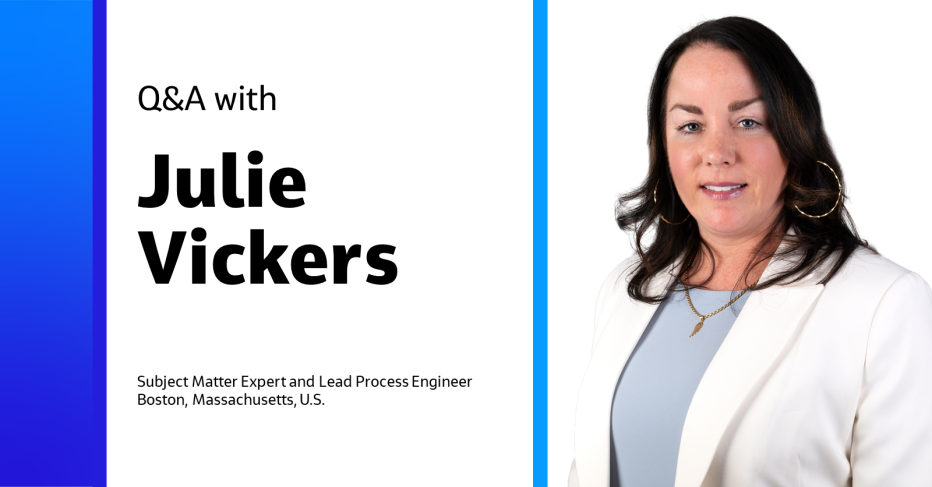
Working at the forefront of life sciences, Subject Matter Expert (SME) and Lead Process Engineer Julie Vickers deploys creative thinking and high-level problem solving to turn design concepts into next-generation cell and gene therapy and mRNA facilities. We interviewed Julie about trends in facility design, how mRNA has the potential to transform product delivery and the importance of diverse, inclusive teams to drive innovation.
Can you tell us about your Jacobs journey and the work that you do?
I joined Jacobs in early 2019 as a lead process engineer. In this role, I was responsible for carrying out detailed engineering work, for example compiling equipment lists and process equipment specifications. I have since been promoted to subject matter expert (SME), where my focus is delivering design concept and feasibility studies for cell and gene therapy, mRNA and viral vector facilities. I’ve always loved solving challenges, so I find it very rewarding to help design process equipment layouts and provide high-level analysis for capacity and utility requirements for clients.
What do you enjoy most about being part of #OurJacobs?
I really enjoy doing facility concept design with the process architects. Effectively, we are taking a blank canvas, laying out the equipment and creating a vision to show clients what their facility could look like and how it could operate. Then it’s about bringing the project to the finish line and watching it get built. I get a huge amount of gratification from seeing my designed concept turning into a facility with these beautiful clean rooms and process equipment that’s going to start operating. It’s an amazing feeling to see it come to life and to know ultimately what we're doing is going to help people around the world.
It must be hugely rewarding to know that your work has changed the lives of so many people around the world.
I’m in the enviable position of working on projects that have the potential to make transformative treatments available to a greater number of patients. Every day when I go to work, I’m focused on the fact that we’re all doing this for the patients. The facilities that we design and build on behalf of clients will produce medicine that may ultimately save lives. This sense of purpose is especially pronounced in cell and gene therapy, where we’re seeing the emergence of new cancer therapies and stem cell processes. With cell therapy and mRNA set to expand over the coming years, it means that our work will have a positive impact on more and more people globally.
Can you tell us about some of the projects that you have worked on recently?
Broadly speaking, facilities in the cell and gene therapy sector are moving towards multiple modalities, and increasingly, this trend is reflected in the client projects I work on. For example, one project that’s under construction right now will have the capability to manufacture both cell therapies in large batches (allogeneic) and for specific patients (autologous), while another client facility will have viral vector manufacturing on the same campus as autologous and allogeneic cell therapy processing. Allogeneic stem cell therapy manufacturing is also becoming an emerging technology. While CAR-T (genetically engineered T cells for immunotherapy) cell therapy facilities are still manufacturing at relatively low volumes, it’s possible to scale up the production of stem cell therapies to treat Type One diabetes, Parkinson's and chronic heart failure at much larger scales.
You also work closely on projects in the rapidly evolving mRNA field – do you think it has the potential to transform product delivery?
Absolutely, I believe that it can drive innovation: aside from vaccine delivery, mRNA technology is likely to be deployed in many other applications and settings. As solutions providers, we had to react quickly to COVID-19 and devise ways to produce the vaccine as fast as possible and at scale. While the technology is still evolving, the beauty of mRNA is that smaller batches can produce many patient doses. This gives it the potential to be very scalable, so my hope is that there’s a lot more to come in mRNA beyond the COVID-19 vaccine.
Do you think enough is being done to encourage more women to join the industry?
When I was starting out, there were very few female engineers. The situation has changed and there are more women in the industry, but we can still do more. There’s a very strong argument for having more female role models in the industry, and I'm focused on leading by example for women who are considering a career in engineering and construction.
What benefits have you experienced by working in diverse, inclusive project teams?
Being able to draw on diverse perspectives makes all the difference, especially as so much of my work is conceptual and focused on problem-solving. For example, to help clients overcome challenges related to mRNA projects, we’ve set up an informal knowledge sharing group. I’m also fortunate to be able to tap into the expertise of our wider team in different offices and locations, to glean their perspectives and to ensure we bring diverse but complementary expertise to the table for each project.
People would be surprised to know that…
In my spare time, I really like to cook. I’m half-Portuguese, so I love cooking meals with Mediterranean influences. I also regularly watch the Food Network and other food programs for inspiration!
Join #OurJacobs team
What drives you drives us as we work to build a better world – together. At Jacobs, every day is an opportunity to make the world better, more connected, more sustainable.
We’re always looking for dynamic and engaged people to join our team. Bring your passion, your ingenuity and your vision.












































